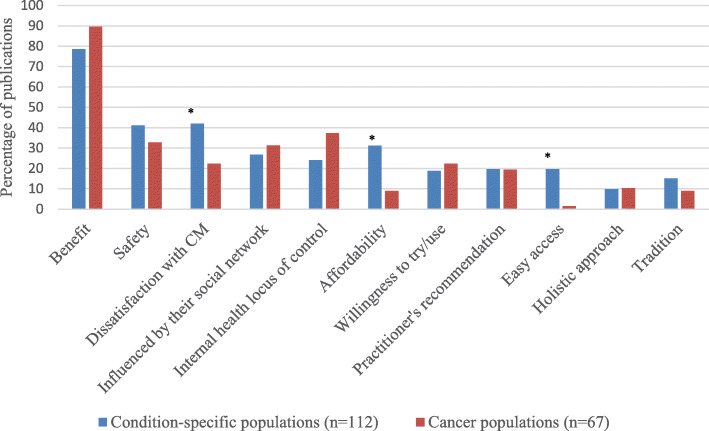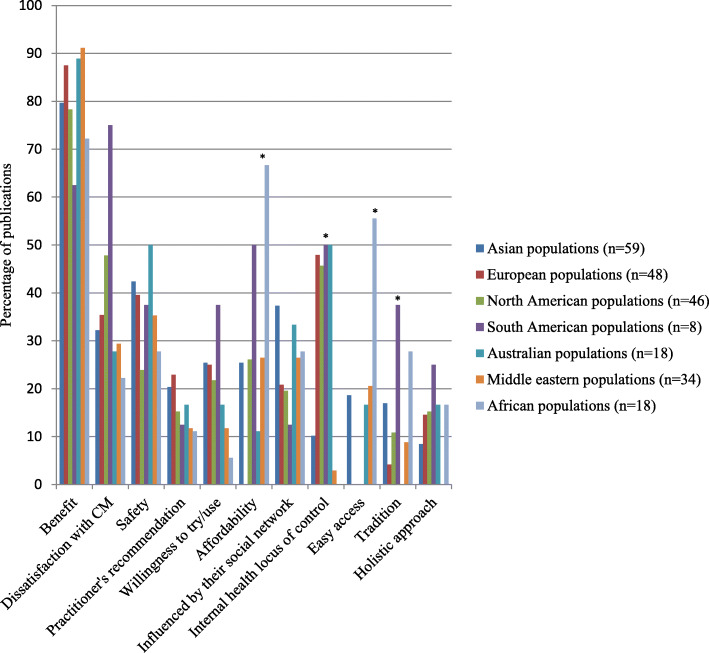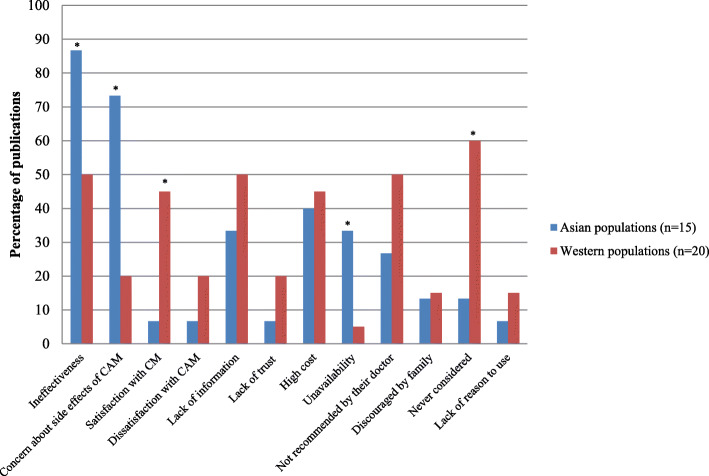The authors of this review wanted to determine similarities and differences in the reasons for using or not using so-called alternative medicine (SCAM) amongst general and condition-specific populations, and amongst populations in each region of the globe.
Quantitative or qualitative original articles in English, published between 2003 and 2018 were reviewed. Conference proceedings, pilot studies, protocols, letters, and reviews were excluded. Papers were appraised using valid tools and a ‘risk of bias’ assessment was also performed. Thematic analysis was conducted. Reasons were coded in each paper, then codes were grouped into categories. If several categories reported similar reasons, these were combined into a theme. Themes were then analysed using χ2 tests to identify the main factors related to reasons for CAM usage.
A total of 231 publications were included. Reasons for SCAM use amongst general and condition-specific populations were similar. The top three reasons were:
- (1) having an expectation of benefits of SCAM (84% of publications),
- (2) dissatisfaction with conventional medicine (37%),
- (3) the perceived safety of SCAM (37%).
Internal health locus of control as an influencing factor was more likely to be reported in Western populations, whereas the social networks was a common factor amongst Asian populations (p < 0.05). Affordability, easy access to SCAM and tradition were significant factors amongst African populations (p < 0.05). Negative attitudes towards SCAM and satisfaction with conventional medicine were the main reasons for non-use (p < 0.05).
The authors concluded that dissatisfaction with conventional medicine and positive attitudes toward SCAM, motivate people to use SCAM. In contrast, satisfaction with conventional medicine and negative attitudes towards SCAM are the main reasons for non-use.
At this point, I thought: so what? This is all very obvious and does not necessitate an extensive review of the published literature. What it actually shows is that the realm of SCAM is obsessed with conducting largely useless surveys, a phenomenon, I once called ‘survey mania‘. But a closer look at the review does reveal some potentially interesting findings.
In less developed parts of the world, like Africa, SCAM use seems to be determined by affordability, accessibility and tradition. This makes sense and ties in with my impression that consumers in such countries would give up SCAM as soon as they can afford proper medicine.
This notion seems to be further supported by the reasons for not using SCAM. Asian consumers claim overwhelmingly that this is because they consider SCAM ineffective and unsafe.
In our review of 2011 (not cited in the new review), we looked at some of the issues from a slightly different angle and evaluated the expectations of SCAM users. Seventy-three articles met our inclusion criteria of our review. A wide range of expectations emerged. In order of prevalence, they included:
- the hope to influence the natural history of the disease;
- the desire to prevent disease and promote health/general well-being;
- the hope of fewer side effects;
- the wish to be in control over one’s health;
- the hope for symptom relief;
- the ambition to boost the immune system;
- the hope to receive emotional support;
- the wish to receive holistic care;
- the hope to improve quality of life;
- the expectation to relief of side effects of conventional medicine;
- the desire for a good therapeutic relationship;
- the hope to obtain information;
- the hope of coping better with illness;
- the expectation of supporting the natural healing process;
- the availability of SCAM.
All of these aspects, issues and notions might be interesting, even fascinating to some, but we should not forget three important caveats:
- Firstly, SCAM is such a diverse area that any of the above generalisations are highly problematic; the reasons and expectations of someone trying acupuncture may be entirely different from those of someone using homeopathy, for instance.
- Secondly (and more importantly), the ‘survey mania’ of SCAM researchers has not generated the most reliable data; in fact, most of the papers are hardly worth the paper they were printed on.
- Thirdly (and even more importantly, in my view), why should any of this matter? We have known about some of these issues for at least 3 decades. Has this line of research changed anything? Has it prevented consumers getting exploited by scrupulous SCAM entrepreneurs? Has it made consumers, politicians or anyone else more aware of the risks associated with SCAM? Has it saved many lives? I doubt it!





my penny-haporth for what it’s worth although I realize it’s a far more complex issue………
it seems there has been a general societal trend towards “individual” choice and autonomy at the expense of individual responsibility and a sense of responsibility towards others and society generally in the West.
in addition a trend towards “natural” being somehow better and an illogical distrust of “chemicals” and things people don’t understand or can’t pronounce and an anti-science bent in general – unless it is in the form of mobile phones or social media or air travel etc so this is internally contradictory.
there is also a distrust of “expertise” so anyone’s opinion is as good as anyone else’s on any subject which is plainly ludicrous. Just because I can google how to fly a Jumbo jet doesn’t make me a skilled pilot – yet people believe they are vaccine experts after 5 minutes on google.
They have no concept of the limits of their ignorance or the bias or limitations of their sources.
Many become “followers” of internet gurus like Del Bigtree or whoever or a particular website and take it for gospel with no ability for critical thinking and no capacity for filtering or changing their opinion.
Instead of intelligent debate there are mass campaigns on the net and media with gross distortions and lies often with personal abuse and threats aiming to crush the other side. There is open hate and vitriol.
Instead of any attempt to seek “truth” there is a religious fervour to convert and inflict harm.
“Science” instead of being seen as the best way we know of to arrive at the truth of a matter is instead seen as the enemy and in its place the preferred modes are anecdotes, lies, propaganda, smears and emotional displays.
I don’t know that I have a solution but I would have thought it might be a start to promote critical thinking in schools and universities as mandatory and make basic science courses more rigorous and widespread as well.
Perhaps public service broadcasting demonstrating some of these issues so that they become topics of conversation.
Regulation of social media companies to prevent the torrent of anti-vaccine and other wild conspiracy theories that pollute people’s minds with toxic nonsense. I know this worries people regarding free speech – but how can it be right for someone to spread what are frank lies and damaging falsehoods that damage people’s health?
I think there must come a point where it is irresponsible and harmful to have a large audience to which you are promulgating harmful and potentially information. Is that really any different from selling a dangerous product?
Surely there ought to be much tighter regulation of SCAM? Whenever I talk to people they always tell me that homeopathy or whatever must be ok otherwise the government wouldn’t let them practise. Because they are “registered” with whatever organization it must be ok – but they do not realize that this means absolutely nothing much at all.
It is a false reassurance. The government, the PSA etc are all allowing the public to be lulled into a false sense of security by thinking that homeos, chiros, naturopaths and others are all in some way regulated in the same way as doctors, dietitians etc when in fact it is effectively the Wild West. Added to which the fact that they are “regulated” is no endorsement that any of these things actually work – e.g. given that Westminster actually pronounced in the case of Homeopathy that it most definitely does not!
Whenever I explain to people what these SCAMs are based on (e.g. that Chiropractic was invented from thin air by a man with absolutely NO medical or anatomical knowledge whatever and that he claimed to communicate with a long dead doctor and allegedly cured deafness by thumping somebody on the back they are understandably horrified.)
Equally most people seem to equate Homeopathy with some form of herbalism – when it is explained that many remedies actually contain one molecule diluted in a quantity of liquid the size of the Atlantic Ocean they are understandably perplexed.
However that is nothing to their horror when I explain some of the remedies homeopaths actually use – like Berlin Wall or Medorrhinum – which is actually prepared from the urethral discharge of male patients with Gonorrhoea! (which in typically homeopath fashion homeos believe is a virus even though it has been known like forever is actually a bacterium!)
It might not be enough on its own – but it must help to correct all these false beliefs the public has about SCAM – that it is “natural” and “harmless” and that SCAMMERS are all cute and cuddly and doing it out of the goodness of their hearts.
That their nostrums contain no nasty “chemicals” and that there is no “BIG Homeopathy” or “Big Naturopathy” behind any of it.
Just let them know about all the totally useless junk Bio Resonance and Vega testing machines out these being used to diagnose fake allergies and hormone deficiencies – all sold by “Big SCAM BioTechnology”.
Then there is “Big Supplement” and “Big Vitamin” all of which these people fail to see.
SCAM is worth well over $100 billion a year – yet the public seem to think all these scammers are doing it all for love and humanity instead of for grift and lucre! It needs much more pushback and a big dose of reality to reveal what is really going on.
very true!
Ahhhh John, but you seem to conveniently forget that GP’s in the UK have prescribed placebo pills to some patients with specific illnesses and medical conditions – and reported around 20% of them experienced positive improvements (i.e. statistically significant). In other words placebo can and does provide a useful tool for mainstream medics. And the studies I’ve seen also found that the colour of the pill or capsule had a positive or negative effect on the patient. What say you?
@ Mike Grant
where exactly did I say that placebos didn’t work?
However prescribing a placebo to a patient without telling them that’s what it is is unethical , deceitful and if you are charging them for “wonder product X” when it’s really a lump of sugar then it’s also fraud.
That is one of the major criticism of SCAM – that the products don’t work so a large part of the mode of action is the placebo effect. But you don’t appear to understand the true nature of this placebo “effect”. It’s not just “fooling” someone that a sugar lump is a drug.
It is also due to statistical effects, the effect of the therapist, expectations, reversion to the mean, natural variations in a condition, and a whole host of other factors.
There are other serious limitations of placebos. The effects are far too variable and unpredictable to be of any clinical value. As I mentioned their use in clinical treatment is unethical – their real value is in clinical trials. But more seriously they only affect symptoms and not the underlying conditions or physiological values – so they cannot be used to treat disease.
There – I hope that clears things up for you.
There is an important difference between making people feel better and actually making them better. I mean, a nice cup of tea and a chat will make people feel better; no need to resort to medical deceptions or financial frauds.
(While GP surgeries frequently partner with pharmacies, what they really should partner with is tea shops. Supportive and ethical.)
Still, it always amuses me when CAMmers resort to Argumentum ad Placebo. It really is the Chewbacca Defense of pseudomedical deflections, and doubly ironic in light of CAM’s other frequent claim that mainstream medicine only treats symptoms, not the disease itself.
TL;DR: Placebo arguments do not protect CAM; they condemn it.
good point!
a glass of wine makes me feel better most days.